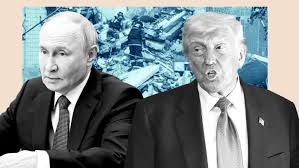
Introduction
The relationship between Vladimir Poutine, the President of Russia, and Donald Trump, the former President of the United States, has stirred considerable debate in political circles worldwide. Their dynamic has implications not only for bilateral relations but also for global power structures and international diplomacy.
Background
Donald Trump and Vladimir Poutine first established a controversial rapport during Trump’s 2016 presidential campaign. Trump openly praised Poutine’s leadership style, which raised eyebrows among U.S. allies and adversaries alike. As President, Trump’s approach to Russia was characterized by both overtures of diplomacy and moments of stark confrontation, which have left a lasting mark on U.S.-Russia relations.
Key Events and Developments
One notable instance that highlighted their relationship was the Helsinki Summit in July 2018. During this event, Trump famously expressed doubt over U.S. intelligence assessments regarding Russian interference in the 2016 election, prompting backlash from both parties at home. Many critics accused him of undermining U.S. democracy in favor of improved relations with Russia.
Fast forward to the current state of affairs; President Joe Biden has adopted a confrontational stance towards Poutine, particularly over Russia’s aggressive actions in Ukraine. This shift has created a stark contrast to Trump’s approach and may influence the Republican Party’s positioning as it heads into the 2024 election cycle.
Current Context
Recently, ongoing geopolitical tensions, particularly regarding the war in Ukraine, have increasingly spotlighted the intricate balance of power between the U.S. and Russia. Trump’s comments and positions regarding Poutine remain influential among certain factions of the Republican Party, potentially swaying voter opinions ahead of elections. Public opinion polls indicate that sentiments towards Russia are changing rapidly, with rising fears of authoritarianism influencing views on global leadership.
Conclusion
The relationship between Vladimir Poutine and Donald Trump exemplifies the complexities of modern geopolitics. As the world navigates the ramifications of current conflicts and power dynamics, understanding this relationship remains vital for analysts, policymakers, and voters. Observing how this association continues to shape discourse within the Republican Party may provide significant insight into the future of U.S.-Russia relations, particularly as the 2024 presidential election approaches.




